The École spéciale militaire de Saint-Cyr is a French military academy, and is often referred to as Saint-Cyr. It is located in Coëtquidan in Guer, Morbihan, Brittany. Its motto is Ils s'instruisent pour vaincre, literally meaning "They study to vanquish" or, more freely put, "Training for victory". French cadet officers are called saint-cyriens or cyrards. France's other most senior military education institute is the École de guerre (EdG), located in the École militaire complex, in Paris.

Maurice Gustave Gamelin was a French general. He is remembered for his disastrous command of the French military during the Battle of France in World War II and his steadfast defence of republican values.

Alphonse Pierre Juin was a senior French Army general who became Marshal of France. A graduate of the École Spéciale Militaire class of 1912, he served in Morocco in 1914 in command of native troops. Upon the outbreak of the First World War, he was sent to the Western Front in France, where he was gravely wounded in 1915. As a result of this wound, he lost the use of his right arm.

Jean Jules Henri Mordacq was a French general. During his early years as a captain he was the sabre champion of the French Army's officer corps. In World War I, he was a frontline commander of initially the 159th Regiment of Alpine Infantry, then the 90th Brigade, and finally the 24th Infantry Division, in the process being wounded twice on the battlefield. In 1918 and the Paris Peace Conference, he was a close aide to Clemenceau.
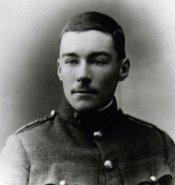
Lieutenant General Sir Philip Neame, was a senior British Army officer and a recipient of the Victoria Cross, the highest award for gallantry in the face of the enemy that can be awarded to British and Commonwealth forces, and the winner of an Olympic Games gold medal; he is the only person to achieve both distinctions.

Noël Édouard, vicomte de Curières de Castelnau was a French military officer and Chief of Staff of the French Armed Forces during the First World War. Elected deputy in 1919 and president of the Army Commission in the legislature, he then took the head of a confessional political movement, the Fédération Nationale Catholique. During the Second World War, he opposed Marshal Pétain and the Vichy regime and supported the French Resistance. For a long time controversial because of a Catholicism that was considered outrageous by his opponents, historians have moderated that portrait by emphasising his great loyalty to republican institutions and disputed in particular that he could have been reactionary or anti-Semitic.

Marie Émile Fayolle was a French general during World War I and a diplomat, elevated to the dignity of Marshal of France.
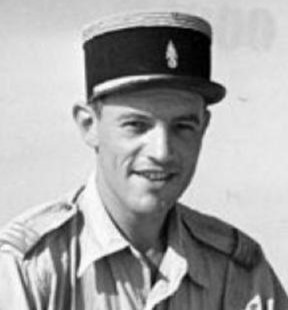
André Lalande was a French Army officer and general in the Chasseurs Alpins and French Foreign Legion. He fought during the World War II at the heart of the Free French Forces, then in Indochina and Algeria.

Lieutenant General Robert William Moncel was a senior officer in the Canadian Army. Moncel was Lieutenant-General of the Canadian Army and former Vice Chief of the Defence Staff. He was the youngest general officer in the Canadian Army when promoted to Brigadier on 27 August 1944, at the age of 27.
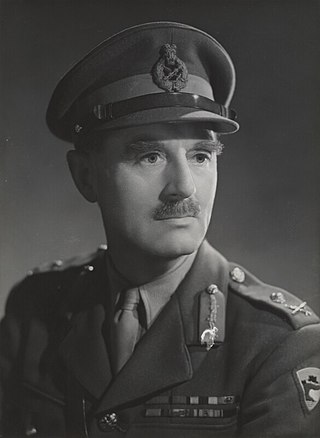
Major-General Eric Grant Miles CB DSO MC was a senior British Army officer who saw active service during both World War I and World War II, where he commanded the 126th Infantry Brigade in the Battle of France and the 56th (London) Infantry Division in the final stages of the campaign in Tunisia.
Jean Marcellin Joseph Calixte Gilles was a French Army general who served in World War II and several colonial conflicts.
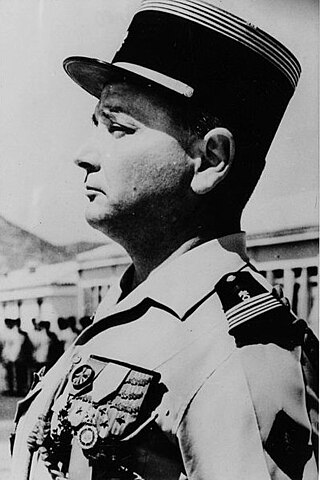
Paul Marie Félix Jacques René Arnaud de Foïard was a général in the French Army who served primarily in the French Foreign Legion taking part in World War II and the conflicts of Indochina and Algeria.
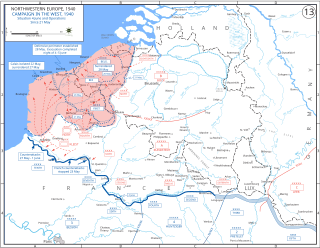
The siege of Lille or Lille pocket took place during the Battle of France in the Second World War. The siege of the French IV Corps and V Corps of the First Army was conducted by four German infantry divisions supported by three panzer divisions.
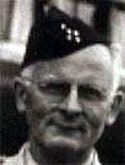
André Zeller was a French Army general. He served during World War I, the Franco-Turkish War, and World War II, and served as chief of staff of the French Army during the Algerian War.
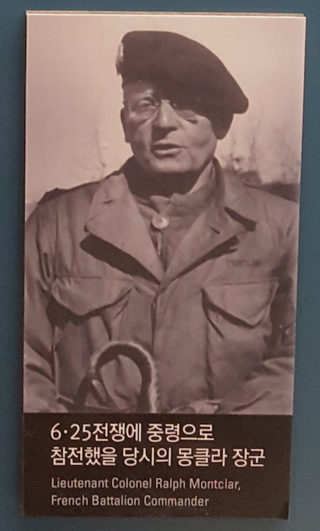
Raoul Charles Magrin-Vernerey, also known as Ralph Monclar was a French officer and 2nd Inspector of the Foreign Legion who fought in World War I, World War II within the ranks of the Free French Forces and led the French Battalion in the Korean War. He was also one of the first senior officers to respond to the Appeal of 18 June.

Georges Henri Journois was a French resistance fighter and Brigadier General who died in a subcamp of the Neuengamme concentration camp in Wilhelmshaven, Germany.
René Jacques Adolphe Prioux was a French general who served in both world wars. A cavalry officer of great talent, Prioux rapidly rose through the officer ranks and commanded the Cavalry Corps of the First Army during the Battle of Belgium in May 1940. He was captured by the Germans and spent two years as a prisoner of war. Repatriated in 1942, Prioux came to be seen as a strong supporter of the Vichy regime and was consequently removed from a position of authority in the French Army by Charles de Gaulle, the leader of the Free French, after the landings in French north Africa by U.S. and British forces in November 1942.
Dimitrios Papadopoulos was a Hellenic Army officer who reached the rank of Lieutenant General. He is most notable for his leadership in the Greco-Italian War of 1940–41.
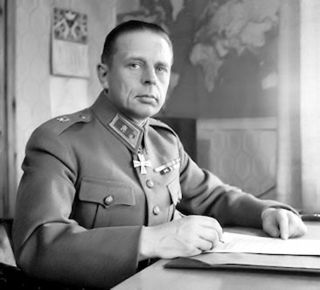
Armas-Eino Martola was a Finnish general of the infantry, a knight of the Mannerheim Cross and a member of the Jäger Movement. He participated in the Eastern Front of World War I, the Finnish Civil War, the Winter War and the Continuation War. In his later years, he acted as the military advisor to the Secretary-General of the United Nations Dag Hammarskjöld and led the United Nations Peacekeeping Force in Cyprus from 1966 to 1969.

Alphonse Pierre Nudant was a French general who participated in World War I. He commanded several units throughout his service in the war, notably becoming part of the Chief of Staff of the French Fourth Army.















